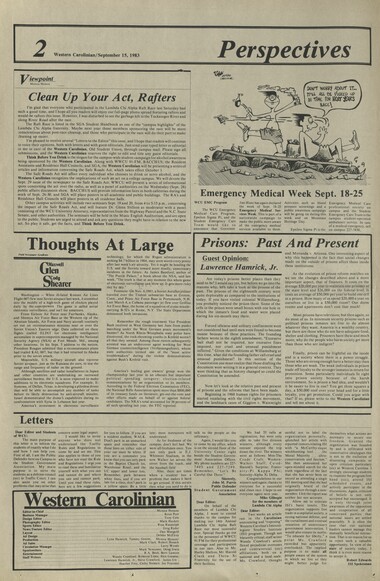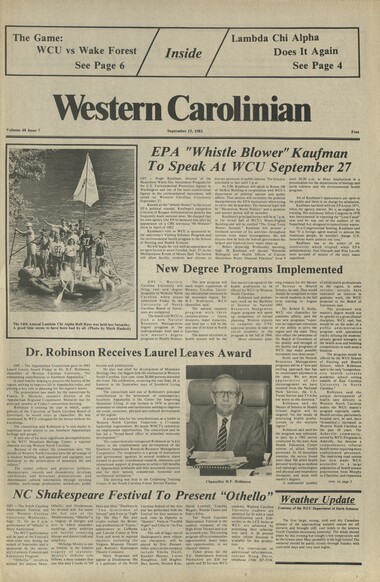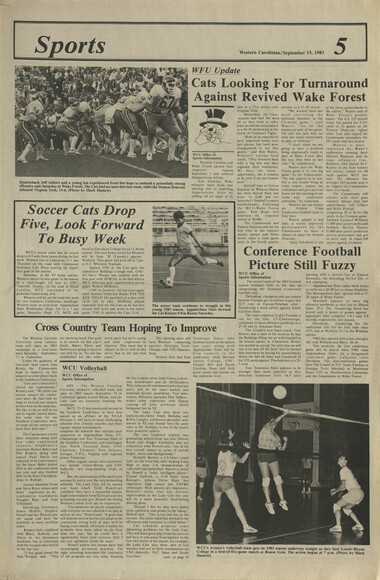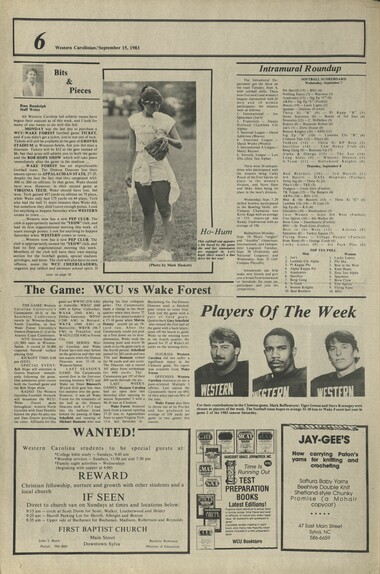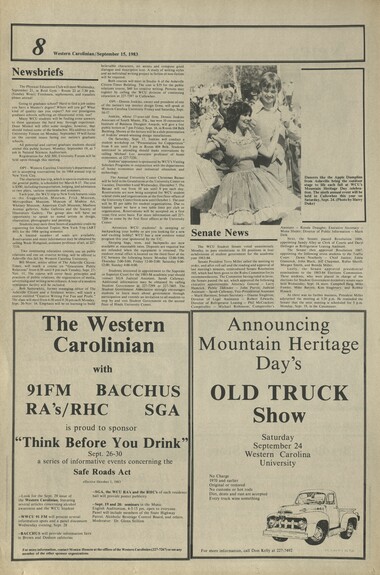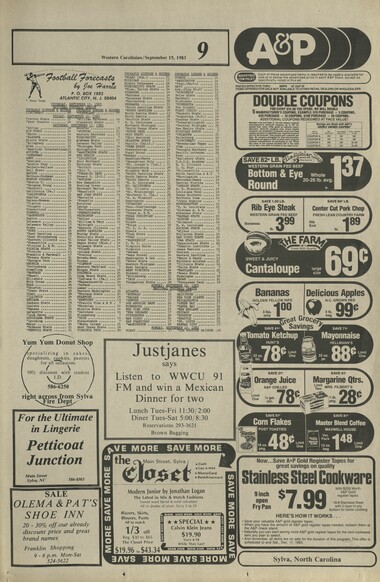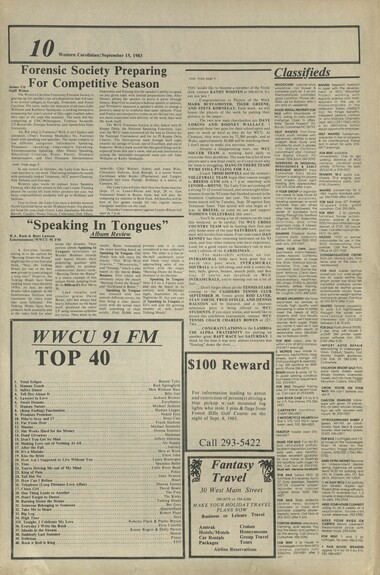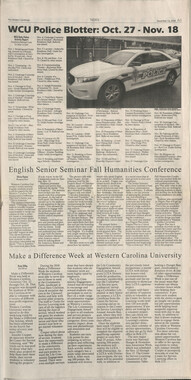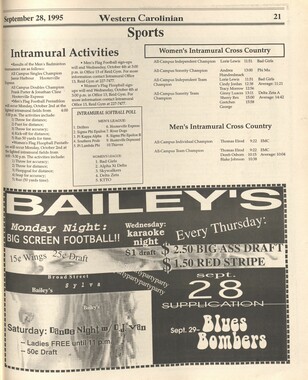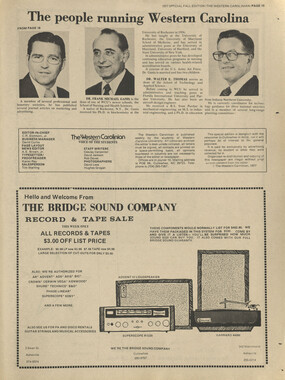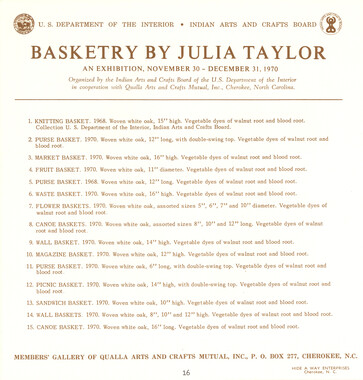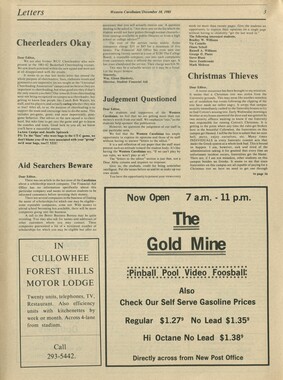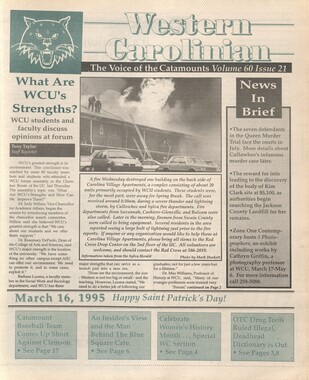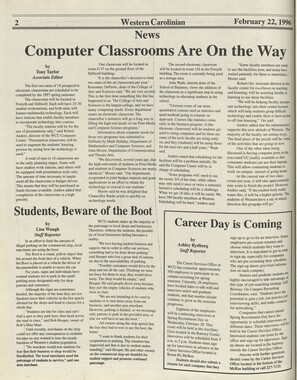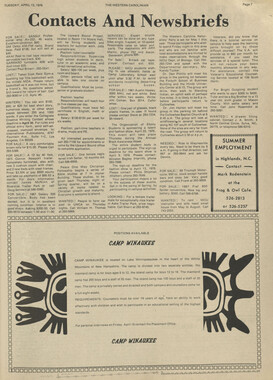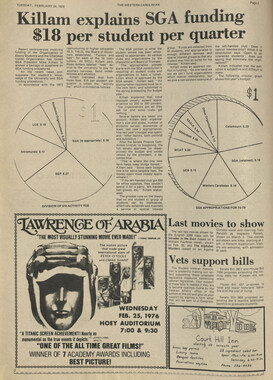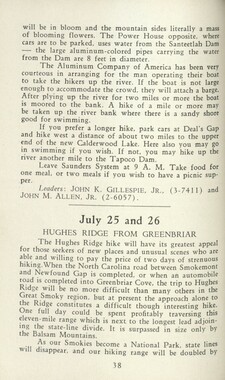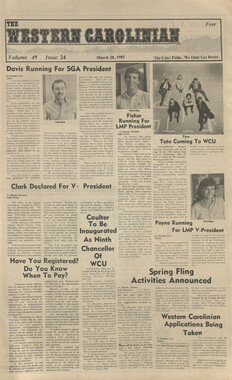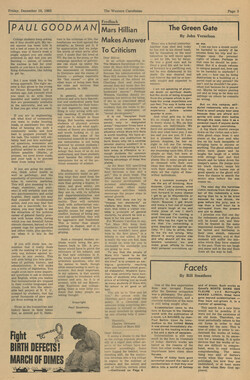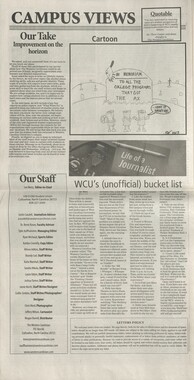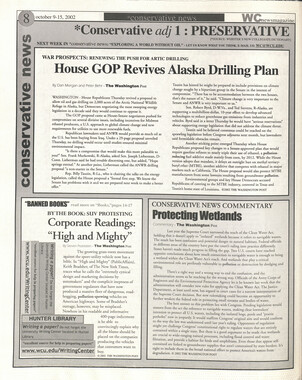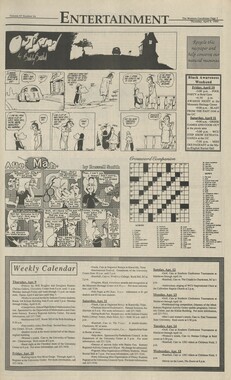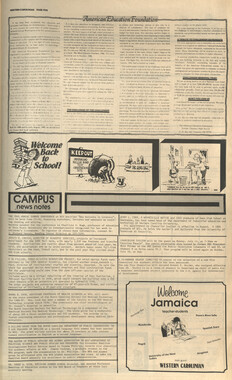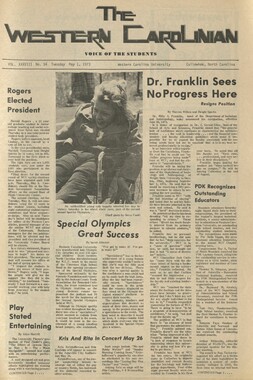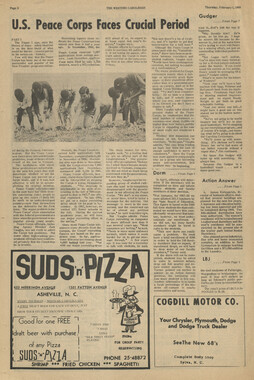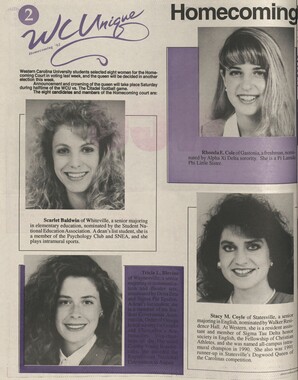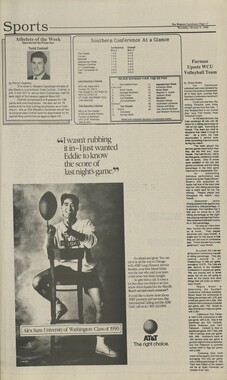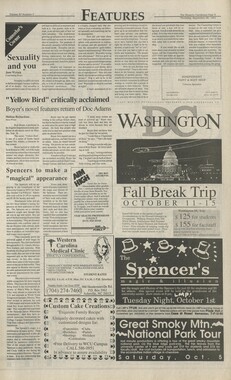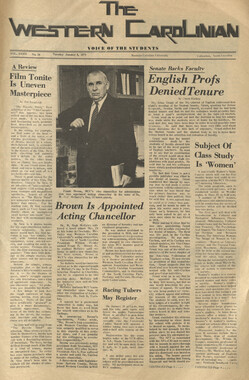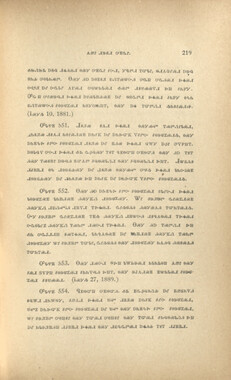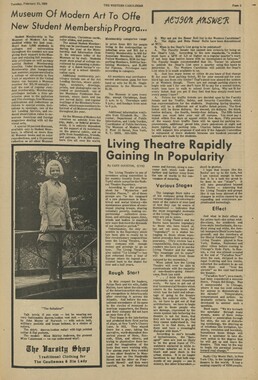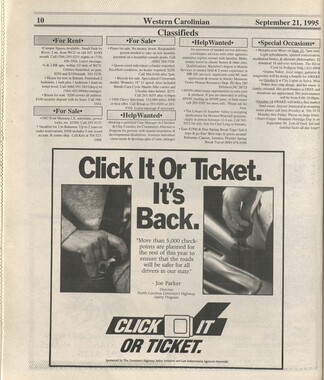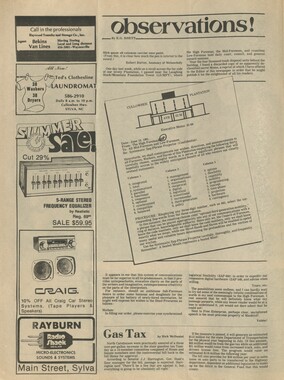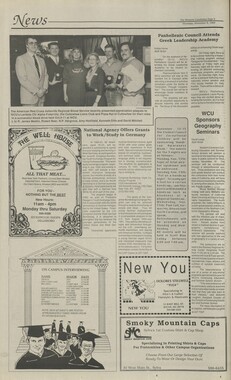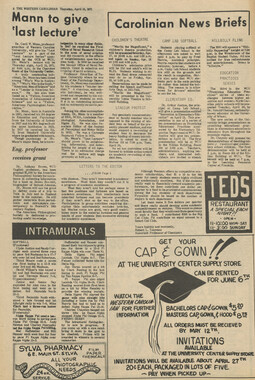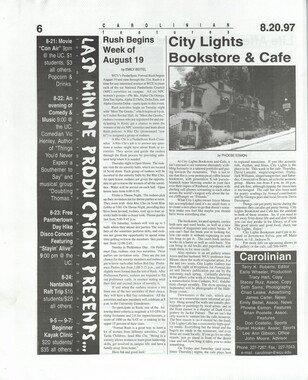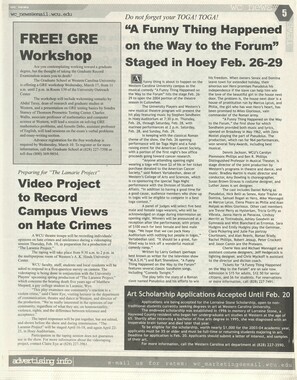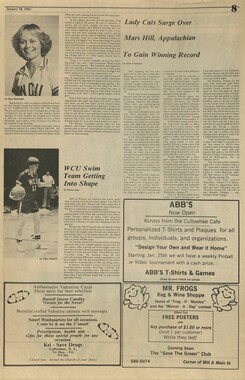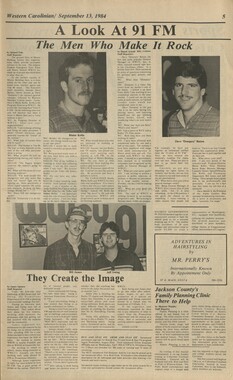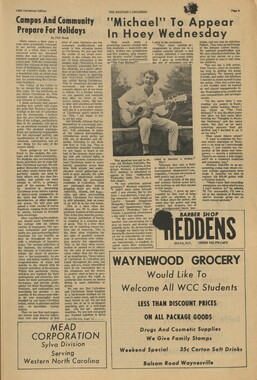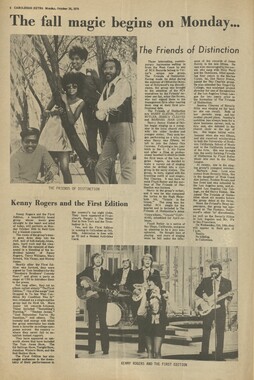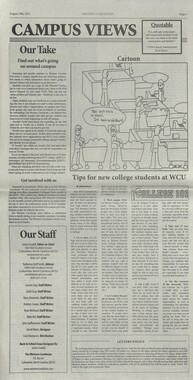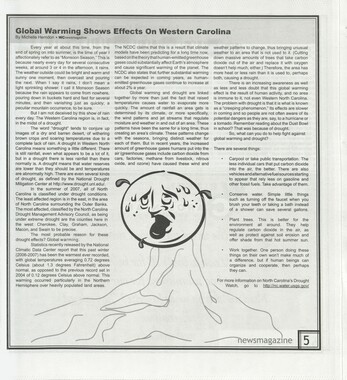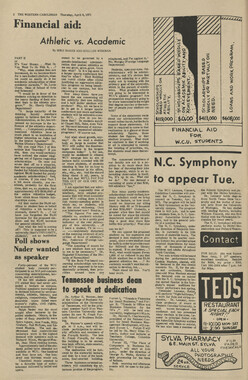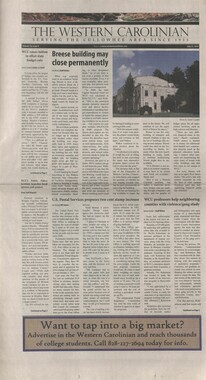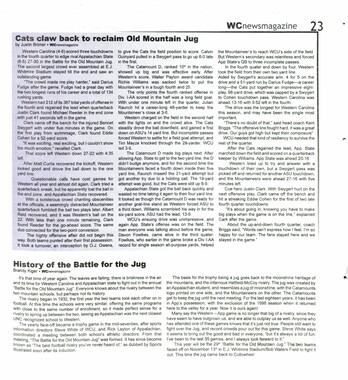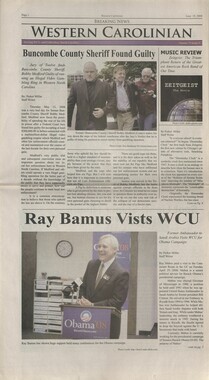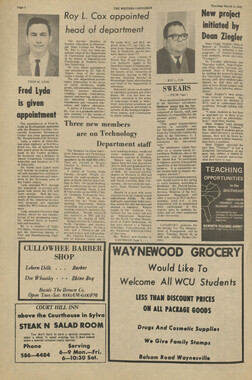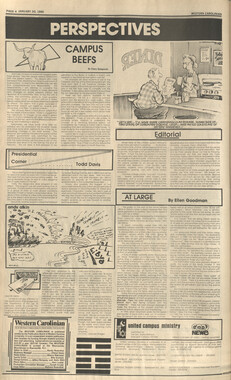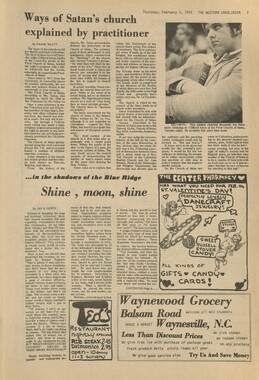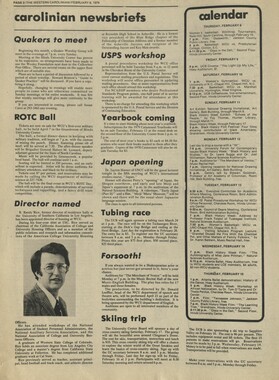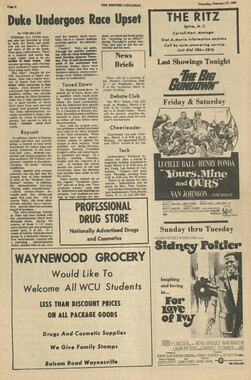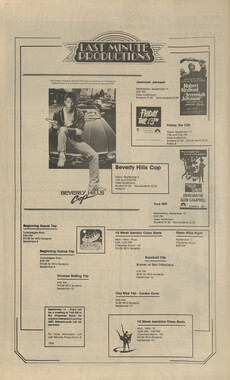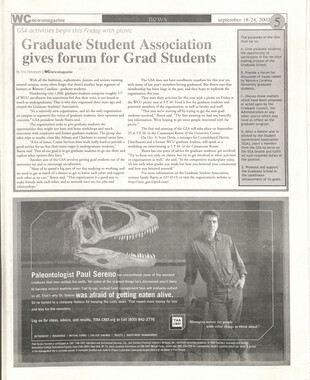Western Carolina University (21)
View all
- Canton Champion Fibre Company (2308)
- Cherokee Traditions (291)
- Civil War in Southern Appalachia (165)
- Craft Revival (1942)
- George Masa Collection (137)
- Great Smoky Mountains - A Park for America (3080)
- Highlights from Western Carolina University (422)
- Horace Kephart (973)
- Journeys Through Jackson (159)
- LGBTQIA+ Archive of Jackson County (89)
- Oral Histories of Western North Carolina (318)
- Picturing Appalachia (6617)
- Stories of Mountain Folk (413)
- Travel Western North Carolina (153)
- Western Carolina University Fine Art Museum Vitreograph Collection (129)
- Western Carolina University Herbarium (92)
- Western Carolina University: Making Memories (738)
- Western Carolina University Publications (2491)
- Western Carolina University Restricted Electronic Theses and Dissertations (146)
- Western North Carolina Regional Maps (71)
- World War II in Southern Appalachia (131)
University of North Carolina Asheville (6)
View all
- Allanstand Cottage Industries (62)
- Appalachian National Park Association (53)
- Bennett, Kelly, 1890-1974 (1463)
- Berry, Walter (76)
- Brasstown Carvers (40)
- Carver, George Washington, 1864?-1943 (26)
- Cathey, Joseph, 1803-1874 (1)
- Champion Fibre Company (233)
- Champion Paper and Fibre Company (297)
- Cherokee Indian Fair Association (16)
- Cherokee Language Program (22)
- Crowe, Amanda (40)
- Edmonston, Thomas Benton, 1842-1907 (7)
- Ensley, A. L. (Abraham Lincoln), 1865-1948 (275)
- Fromer, Irving Rhodes, 1913-1994 (70)
- George Butz (BFS 1907) (46)
- Goodrich, Frances Louisa (120)
- Grant, George Alexander, 1891-1964 (96)
- Heard, Marian Gladys (60)
- Kephart, Calvin, 1883-1969 (15)
- Kephart, Horace, 1862-1931 (313)
- Kephart, Laura, 1862-1954 (67)
- Laney, Gideon Thomas, 1889-1976 (439)
- Masa, George, 1881-1933 (61)
- McElhinney, William Julian, 1896-1953 (44)
- Niggli, Josephina, 1910-1983 (10)
- North Carolina Park Commission (105)
- Osborne, Kezia Stradley (9)
- Owens, Samuel Robert, 1918-1995 (11)
- Penland Weavers and Potters (36)
- Roberts, Vivienne (15)
- Roth, Albert, 1890-1974 (142)
- Schenck, Carl Alwin, 1868-1955 (1)
- Sherrill's Photography Studio (2565)
- Southern Highland Handicraft Guild (127)
- Southern Highlanders, Inc. (71)
- Stalcup, Jesse Bryson (46)
- Stearns, I. K. (213)
- Thompson, James Edward, 1880-1976 (226)
- United States. Indian Arts and Crafts Board (130)
- USFS (683)
- Vance, Zebulon Baird, 1830-1894 (1)
- Weaver, Zebulon, 1872-1948 (58)
- Western Carolina College (230)
- Western Carolina Teachers College (282)
- Western Carolina University (2008)
- Western Carolina University. Mountain Heritage Center (18)
- Whitman, Walt, 1819-1892 (10)
- Wilburn, Hiram Coleman, 1880-1967 (73)
- Williams, Isadora (3)
- Cain, Doreyl Ammons (0)
- Crittenden, Lorraine (0)
- Rhodes, Judy (0)
- Smith, Edward Clark (0)
- Appalachian Region, Southern (3032)
- Asheville (N.C.) (1945)
- Avery County (N.C.) (26)
- Blount County (Tenn.) (195)
- Buncombe County (N.C.) (1680)
- Cherokee County (N.C.) (283)
- Clay County (N.C.) (556)
- Graham County (N.C.) (238)
- Great Smoky Mountains National Park (N.C. and Tenn.) (525)
- Haywood County (N.C.) (3573)
- Henderson County (N.C.) (70)
- Jackson County (N.C.) (4925)
- Knox County (Tenn.) (35)
- Knoxville (Tenn.) (13)
- Lake Santeetlah (N.C.) (10)
- Macon County (N.C.) (421)
- Madison County (N.C.) (216)
- McDowell County (N.C.) (39)
- Mitchell County (N.C.) (135)
- Polk County (N.C.) (35)
- Qualla Boundary (982)
- Rutherford County (N.C.) (78)
- Swain County (N.C.) (2185)
- Transylvania County (N.C.) (270)
- Watauga County (N.C.) (12)
- Waynesville (N.C.) (86)
- Yancey County (N.C.) (72)
- Aerial Photographs (3)
- Aerial Views (60)
- Albums (books) (4)
- Articles (1)
- Artifacts (object Genre) (228)
- Bibliographies (1)
- Biography (general Genre) (2)
- Cards (information Artifacts) (38)
- Clippings (information Artifacts) (192)
- Copybooks (instructional Materials) (3)
- Crafts (art Genres) (622)
- Depictions (visual Works) (21)
- Design Drawings (1)
- Digital Moving Image Formats (2)
- Drawings (visual Works) (185)
- Envelopes (101)
- Exhibitions (events) (1)
- Facsimiles (reproductions) (1)
- Fiction (general Genre) (4)
- Financial Records (12)
- Fliers (printed Matter) (67)
- Glass Plate Negatives (381)
- Guidebooks (2)
- Internegatives (10)
- Interviews (823)
- Land Surveys (102)
- Letters (correspondence) (1045)
- Manuscripts (documents) (618)
- Maps (documents) (177)
- Memorandums (25)
- Minutes (administrative Records) (59)
- Negatives (photographs) (6090)
- Newsletters (1290)
- Newspapers (2)
- Notebooks (8)
- Occupation Currency (1)
- Paintings (visual Works) (1)
- Pen And Ink Drawings (1)
- Periodicals (194)
- Personal Narratives (10)
- Photographs (12977)
- Plans (maps) (1)
- Poetry (6)
- Portraits (4568)
- Postcards (329)
- Programs (documents) (181)
- Publications (documents) (2444)
- Questionnaires (65)
- Relief Prints (26)
- Sayings (literary Genre) (1)
- Scrapbooks (282)
- Sheet Music (2)
- Slides (photographs) (402)
- Songs (musical Compositions) (2)
- Sound Recordings (802)
- Specimens (92)
- Speeches (documents) (18)
- Tintypes (photographs) (8)
- Transcripts (329)
- Text Messages (0)
- A.L. Ensley Collection (275)
- Appalachian Industrial School Records (7)
- Appalachian National Park Association Records (336)
- Axley-Meroney Collection (2)
- Bayard Wootten Photograph Collection (20)
- Bethel Rural Community Organization Collection (7)
- Blumer Collection (5)
- C.W. Slagle Collection (20)
- Canton Area Historical Museum (2110)
- Carlos C. Campbell Collection (462)
- Cataloochee History Project (64)
- Cherokee Studies Collection (4)
- Daisy Dame Photograph Album (5)
- Daniel Boone VI Collection (1)
- Doris Ulmann Photograph Collection (112)
- Elizabeth H. Lasley Collection (1)
- Elizabeth Woolworth Szold Fleharty Collection (4)
- Frank Fry Collection (95)
- George Masa Collection (173)
- Gideon Laney Collection (452)
- Hazel Scarborough Collection (2)
- Hiram C. Wilburn Papers (28)
- Historic Photographs Collection (236)
- Horace Kephart Collection (861)
- Humbard Collection (33)
- Hunter and Weaver Families Collection (1)
- I. D. Blumenthal Collection (4)
- Isadora Williams Collection (4)
- Jesse Bryson Stalcup Collection (47)
- Jim Thompson Collection (224)
- John B. Battle Collection (7)
- John C. Campbell Folk School Records (80)
- John Parris Collection (6)
- Judaculla Rock project (2)
- Kelly Bennett Collection (1482)
- Love Family Papers (11)
- Major Wiley Parris Civil War Letters (3)
- Map Collection (12)
- McFee-Misemer Civil War Letters (34)
- Mountain Heritage Center Collection (4)
- Norburn - Robertson - Thomson Families Collection (44)
- Pauline Hood Collection (7)
- Pre-Guild Collection (2)
- Qualla Arts and Crafts Mutual Collection (12)
- R.A. Romanes Collection (681)
- Rosser H. Taylor Collection (1)
- Samuel Robert Owens Collection (94)
- Sara Madison Collection (144)
- Sherrill Studio Photo Collection (2558)
- Smoky Mountains Hiking Club Collection (616)
- Stories of Mountain Folk - Radio Programs (374)
- The Reporter, Western Carolina University (510)
- Venoy and Elizabeth Reed Collection (16)
- WCU Gender and Sexuality Oral History Project (36)
- WCU Mountain Heritage Center Oral Histories (25)
- WCU Oral History Collection - Mountain People, Mountain Lives (71)
- WCU Students Newspapers Collection (1923)
- Western North Carolina Tomorrow Black Oral History Project (69)
- William Williams Stringfield Collection (2)
- Zebulon Weaver Collection (109)
- African Americans (390)
- Appalachian Trail (35)
- Artisans (521)
- Cherokee art (84)
- Cherokee artists -- North Carolina (10)
- Cherokee language (21)
- Cherokee pottery (101)
- Cherokee women (208)
- Church buildings (190)
- Civilian Conservation Corps (U.S.) (111)
- College student newspapers and periodicals (2012)
- Dams (108)
- Dance (1023)
- Education (222)
- Floods (63)
- Folk music (1015)
- Forced removal, 1813-1903 (2)
- Forest conservation (220)
- Forests and forestry (1198)
- Gender nonconformity (4)
- Great Smoky Mountains National Park (N.C. and Tenn.) (181)
- Hunting (47)
- Landscape photography (25)
- Logging (122)
- Maps (83)
- Mines and mineral resources (9)
- North Carolina -- Maps (18)
- Paper industry (38)
- Postcards (255)
- Pottery (135)
- Railroad trains (72)
- Rural electrification -- North Carolina, Western (3)
- School integration -- Southern States (2)
- Segregation -- North Carolina, Western (5)
- Slavery (5)
- Sports (452)
- Storytelling (243)
- Waterfalls -- Great Smoky Mountains (N.C. and Tenn.) (66)
- Weaving -- Appalachian Region, Southern (280)
- Wood-carving -- Appalachian Region, Southern (328)
- World War, 1939-1945 (173)
Western Carolinian Volume 48 Number 07
Item
Item’s are ‘child’ level descriptions to ‘parent’ objects, (e.g. one page of a whole book).
-
-
Clean Up Your Act, Rafters I'm glad that everyone who participated in the Lambda Chi Alpha Raft Race last Saturday had such a good time, and I hope all you readers will enjoy our full-page photo spread featuring rafters and would-be rafters this issue. However, I was disturbed to see the garbage left in the Tuckasegee Riverand along River Road after the race. The Raft Race is listed in the SGA Student Handbook as one of the "campus highlights" of the Lambda Chi Alpha fraternity. Maybe next year those members sponsoring the race will be more conscientious about post-race cleanup, and those who participate in the race will do their part to make cleaning up easier. I'm pleased to receive several "Letters to the Editor"this issue, and Ihope that readers will continue to voice their opinions, both with letters and with guest editorials. Just send your typed letter or editorial to me in care of the Western Carolinian, Old Student Union, through campus mail. Please sign all submissions, and the Western Carolinian reserves the right to edit and title any guest editorials. Think Before You Drink is the slogan for the campus-wide student campaign for alcohol awareness being sponsored by the Western Carolinian. Along with WWCU 91-FM, BACCHUS, the Resident Assistants and Residence Hall Councils, and SGA, the Western Carolinian will be presenting a series of articles and information concerning the Safe Roads Act, which takes effect October 1. The Safe Roads Act will affect every individual who chooses to drink or serve alcohol, and the Western Carolinian recognizes the implications of such an act on a college campus. We will devote the Sept. 29 issue of the newspaper to the Safe Roads Act; WWCU will present a series of informational spots concerning the act over the radio, as well as a panel of authorities on the Wednesday (Sept. 28) public affairs discussion show. BACCHUS will provide information fairs in both cafeterias during the week of Sept. 26-30, and SGA will place posters in all academic and public buildings. The RA's and Residence Hall Councils will place posters in all residence halls. Other campus activities will include two seminars Sept. 19 and 20, from 4 to 5:15 p.m., concerning the impact of the Safe Roads Act, and will feature Dr. Glenn Stillion as moderator with a panel consisting of the WCU University Attorney, representatives from the Highway Patrol and the N.C. State Senate, and other authorities. The seminars will be held in the M usic English Auditorium, and are open to the public. Students are urged to attend and ask any questions they might have in relation to the new act. So play it safe, get the facts, and Think Before You Drink. Thoughts At Large Field Newspaper Syndicate Maxwell len G Oodtt hearer Washington — When ill-fated Korean Air Lines Flight 007 flew into Soviet airspace last week, it stumbled into the middle of a high-tech game of chicken played daily by the superpowers The game is called aerial electronic surveillance, and isn't for amateurs. From Eielson Air Force near Fairbanks, Alaska, and Shemya Air Force Base at the Western tip of the Aleutian Islands, Air Force and Navy aircraft routinely set out on reconnaissance missions near or over the Soviet Union's Eastern edge. Data collected on these flights (called ELINT for electronic intelligence) accumulate in supercomputers managed by the National Security Agency (NSA) at Fort Meade, Md., among other locations. In his Sept. 5 address to the nation, President Reagan admitted that a reconnaissance plane had trailed KAL 007, but that it had returned to Alaska prior to the soviet attack. Meanwhile, U.S. military aircraft also traverse Soviet airspace, just as the Russians do ours, to test the range and frequency of radar on the ground. Although satellites and radar installations in Japan and other countries are undertaking an increased surveillance burden, the U.S. is soon expected to make additions to its electronic squadrons. For example, E- Systems, of Dallas, Texas, is developing a pilotless drone that will be able to accomplish any number of tasks before its likely destruction by anti-aircraft missiles. Israel demonstrated the drone's capabilities during its confrontation with Syria in Lebanon last year. America's investment in electronic surveillance technology, for which the Regan administration is seeking $4.7 billion in 1984, may seem worth every penny after last week's air atrocity. Yet it might be heading the U.S. and the Soviets toward more deadly, unnecessary incidents in the future. As James Bamford, author of "The Puzzle Palace," a book about the NSA, said last week, 'The truth is that at any moment this whole game of electronic surveillance can blow up. It gets more risky day by day." Footnote: On Nov. 8,1981, a Soviet Aeroflot jetliner traveled over the Trident submarine base at Groton, Conn., and Pease Air Force Base in Portsmouth, N.H. Last March 4, a Cubana passenger jet flew over Griffiss Air Force Base, the home of a squadron of cruise missile- carrying B-52's in Rome, N.Y. The State Department denounced both intrusions. Remember the rough treatment Vice President Bush received in West Germany last June from punks marching under the West German peace movement's banner? As North Rhein-Westphalia state police have discovered, the rock-throwing youths in Krefeld weren't all that they seemed. Among those rioters subsequently arrested was an undercover agent working for West German counterintelligence (Verfassungschutz), whom state authorities termed one of the "most active troublemakers" during the violent demonstrations against Bush's Krefeld visit. America's leading gun owners' group won the championship last year in an obscure but important political spending category: election-related communications by an organization to its members. According to the Federal Election Commission (FEC), the National Rifle Association spent more than $800,000 of its treasury funds on literature, get-out-the-vote and other efforts made on behalf of or against federal candidates. The NRA's total accounted for 36 percent of all such spending last year, the FEC reported. <^Si - Emergency Medical Week Sept. 18-25 WCU EMC Program The WCU Emergency Medical Care Program, Epsilon Sigma Pi, and the Student Emergency Care Team would like to announce that Governor Jim Hunt has again declared the week of Sept. 18-25 Emergency Medical Services Week. This is part ofa nationwide campaign to make the public more aware of the emergency medical services available to them. Activities such as blood pressure screenings and a public awareness campaign will be going on during this week and on Mountain Heritage Day. Epsilon Sigma Pi is the Emergency Medical Care professional society on campus and the Student Emergency Care Team is the campus student-operated ambulance service. In case of a medical emergency, call on campus 227-7430, Prisons: Past A nd Present Guest Opinion: Lawrence Hamrick, Jr. Are today's prisons better places than they used to be? 1 would say yes, but before we go into the reasons why, let's take a look at the prisons of the past. The prisons of the eighteenth century were quite deplorable as compared to the institutions of today. If you have visited colonial Williamsburg, you probably noticed the prison there. Some ofthe cells in the prison were small boxes with one hole in which the inmate's food and water were placed during his six-month stay there. Forced idleness and solitary confinement were not considered bad until men were found to become insane because of these practices. The founding fathers wrote in the eighth amendment, "Excessive bail shall not be required, nor excessive fines imposed, nor cruel and unusual punishment inflicted." Given the conditions at Williamsburg at this time, what did the founding father call cruel and unusual punishment? In this section of the Constitution one must realize that those drafting the document were writing it in a general context. They were thinking that as history changed so could the Constitution be amended. Now let's look at the relative past and present of prisons and the reforms that have been made. Beginning in 1960 human rights for prisoners started escalating with the civil rights movement, and the landmark cases of Giggion v. Wainwright and Mirranda v. Arizona. One interesting aspect of why this happened is the fact that social changes made on the outside of prisons affect those inside these institutions. As the evolution of prison reform marches on we see the changes described above and a more important aspect, that of finances. It costs on the average $20,000 per year to maintain one prisoner at the state level and $26,000 on the federal level. It costs an average of $50,000 per year to build one cell in a prison. H ow mapy of us spend $20,000 a year on ourselves or live in a $50,000 room? Our dorm rooms and apartments don't cost that much! Most prisons have television; but then again, so do most of us. In minimum security prisons such as political prisons inmates are free to do almost whatever they want. America is a wealthy country, but there are those who do not have adequate food, shelter and clothing. Prisoners have these and much more; why do the people who harm society get more than those who are indigent? Finally, prison can be frightful on the inside and is a society where there is a power struggle. Those who are strong enough have a better stay than those who are weak. The weak individuals in prison trade off loyalty to the stronger inmates in return for protection. Some particularly individuals fit right into prison society because of the harsh environment. So is prison a bad idea, and wouldn't it be easier to live in one? You get three squares a day, a $50,000 roof over your head and for a little loyalty, you get protection. Could you argue with that? If so, please write to the Western Carolinian and tell me about it. Letters Dear Editor and Students of WCU: The main purpose of this letter is to inform the students of exactly what I do and how I can help you. First of all, I am the Public Defender here on Campus in the Student Government Association. My main purpose is to serve the students as a defense council (sic) in Traffic Court. I can also assist you on other problems that may arise that concern some legal aspect. I would like to invite anyone who does not understand the Traffic Rules and Regulations to come by and see me. This also applies to those of you who have not read the Rule and Regulations. I urge you to read these and familiarize yourself with what you can and cannot do and where you can and cannot park. Until you read these rules, here are a few suggestions for you to follow. If you are a resident student, WALK. Don't park in an unmarked space and remember that those lines on either side of your car must be white. If you are a commuter you know that you can only park in the Baptist Church lot, Warehouse Road, and the UC upper and lower lots. Remember, park between white lines, and if you are late for a class, don't park in a yellow space. Be a little late; most instructors will understand. As for freshmen of the campus, don't feel bad. We were all freshmen once. You can only park in E.J. Whitmire Stadium, in the new Walker lot across the street from the track, and the baseball field Also, there are times when a student has a problem that makes it hard to get around. If this occurs then what you need to do is Western Carolinian Editor-in-Chief Monica Henson Business Manager Kenn ^°\x Design Editor " T°!\y ™e Photography Editor Mark Haskett Sports Editor Russ Randolph News/Feature Editor Gre8 Ryder Layout Dan Mangold Ad Design Debbie McElroy Production Lynn Hamrick, Tammy Greene, Monica Henson' Ad Sales Mark Clark, Robert Hosack Circulation Manager '.".".'.". '.'.'.'. . Larry Woods Sportswriters , Mark Newsome, Doug Irwin Entertainment R A Bush- Brett Uwson Staff Writers Wanda Crawford. Rebecca Lines, Alex Lesueur, Lawrence Hamrick, Jr., Steve Crawford. James Utt \ Heather Frey, Cathy Stewart, Joe Fournier talk to the people at the infirmary. Again, I would like you to come by my office, which is on the second floor of the University Center right beside the Student Government Association Offices. My phone numbers are 227- 7405 and 227-7299. Remember, "Let's Be Careful Out There." Sincerely, John M. Purvis Public Defender Student Government Association Dear Editor: On behalf of the members of Lambda Chi Alpha, 1 want to extend thanks to the campus for making our 14th Annual Lambda Chi Alpha Raft Race our most successful ever. Special thanks go out to the personnel of WWCU 91 FM for their professional coverage and participation in our race. Also to Mr. Harley Shelton, Mr. Harold Clark and Theta Xi Fraternity for the use of their facilities. We had 55 rafts at registration, but were only able to take five division winners, although every entrant enjoyed the trip down the river. The winners were as follows: Men-The Crude Craft; Women- Walker Staff; Co-ed- Harold's Surprise; Fraternity-Pi Kappa Phi; Sorority-Alpha Xi Delta. Congratulations to our winners and again, thanks to everyone for a successful and clean race. I hope to see everyone again next year. Mike Gillespie for the members of Lambda Chi Alpha Dear Editor: Two weeks an article ran in the Carolinian announcing and "exposing" Western Carolina's Intercollegiate Studies Institute (ISI) program. Though not blatantly critical, staff writer Wanda Crawford's article flexed prejudicial overtones and contraversial (sic) affiliations, both on a national and a local scale. Ms. Crawford, thought careful not to label the organization personally, splotched her article with reported rumors relating ISI with "a McCarthy-esque witchhunting tool . . .the Moral Majority . . .ultra- conservatism and fascism." She then announced her open-minded search for the truth regardless of the fact that she has never been on record as attending a single ISI meeting and that she had originally heard of the organization through a non- member. I felt the report was neither fair nor accurate. Allow me to reiterate ISI's basic tenets. The organization supports free trade in a capitalist society, a strong national defense, and the curtailment and eventual cessation of unnecessary government intervention. I would also restate its motto, "To educate for liberty," a point Ms. Crawford recorded but apparently overlooked. The implied purpose is to make all people aware of the system in which we live so they might better judge for themselves what actions are necessary to secure our freedom. Granted the organization was founded by and is infiltrated with conservative idealogues this is not to the exclusion of dissenting viewpoints or open criticism particulary (sic) at Western Carolina. I strongly encourage students to examine the program first hand (sic), attend ISI scheduled events, and actively participate in the discussions. Again, criticism of beliefs is not only accepted but encouraged. It is only through joint awareness ofthe opposition and cooperation of all concerned parties that national issues are settled peaceably. It is often the case that our national leaders cannot manage this mutually beneficial interaction. That is no reason for us to reject such a valuable opportunity. In view ofthe state of society today, I think it is even more reason to accept it. Robert Edwards ISI Spokesman
Object
Object’s are ‘parent’ level descriptions to ‘children’ items, (e.g. a book with pages).
-
The Western Carolinian is Western Carolina University's student-run newspaper. The paper was published as the Cullowhee Yodel from 1924 to 1931 before changing its name to The Western Carolinian in 1933.
-
